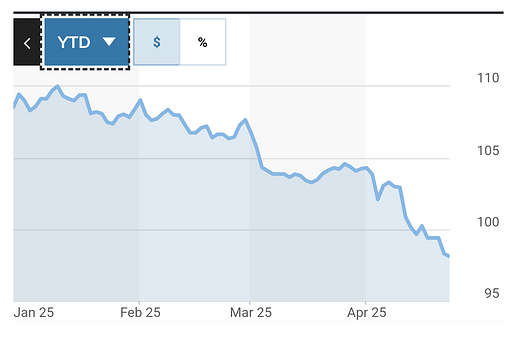The usual suspects just can’t stop taking it too far … the flags are for posts with nothing to do with synths. It is getting tedious - the ‘topic’ will be made into a chat if possible, let’s see how that works out
This topic was automatically opened after 7 days.
The “IRA” and Biden tarrifs on China (two rounds of them, one right before election) was not a separate policy. It is actually a data point in a continuos and misguided US economic war on China.
Other data points in this series, include the tarrifs that Trump I adminstration imposed (and Biden raised) and now Trump’s further raising tarrifs.
Further data points in the same series include US accusing Huawei of surveillance and induding Europeans to no longer buy Huwuawei’s communication infrastructure products; Janet Yellen’s visit to China to admonish them about “overcapacity”; and the US imposing non-tariff barries such as claims of labour exploitation as a means of blocking certain products such as solar panels from being imported to the US and to Europe.
This has been going on for at least a decade and spanning different US governments, run by different political parties.
So no Biden’s policies were not different or better.
Furthermore the biggest effect of the IRA was actually to suck the life out of European manufacturing sector and induce European companies to close factories in Europe and set them up in the US. Several years ago, the IRA resulted in several European countries actually going to have the EU complain to the US about preying on “allies”.
This is a long running saga, its not going away. And synthesizers are the least of the problem, as the price of everything in the US is going to keep going up. Question will be whether people keep buying hardware synthesizers at all.
Looks to me like this is a long term kneecapping of hardware synth sales in the US. Because soon, almost the only people who will be able to afford hardware synths are people who are actually performing musicians making money on them. The flood of hobbyists that have lifted this sector for so long, will basically have to buy software - or behringer knockoffs of older synths.
But for Roland, Yamaha, Korg etc and the many high priced boutiques, this is a kneecapping. For good.
For the moment, you still need a computer hardware to run software synths. So perhaps it will all lead to a slow-down in hardware development. I also can’t imagine OS upgrades keeping up with today’s pace if people start postponing hardware upgrades due to increased prices. At the same time, there is pressure to fix security-related bugs in both hardware and software.
I imagine demand and prices for used gear is going to shoot up in the US.
I was just contemplating this very thing last night. A 145% additional fee effectively completely prices out most Americans from buying just about anything manufactured in China. I’ve got a decent income but there’s no universe in which I can justify paying roughly $1000 for a $400 product. This will almost certainly forced used prices up as used gear already in the states is going to be the only thing most people will be able to afford.
Out of curiosity do we know where Elektron Products are made?
My OT Mk2 says “Made in Poland”.
Extensive thread on manufacturing locations here:
there’s a dude over on MW who posted that he had waited over a decade for his Synthi AKS to be made. it happened to enter the US the day after tariffs were put in place, and a couple days before they were paused. it’s like a $20k purchase. I don’t even want to think of what he paid for that. ![]()
Chinese musicians will have the best electronic instruments, the rest of the world will go back to the harpsichord and clarinet
Tariffs are only a thing in Trumpland. Europe is not affected by US tariffs. Means, only the US will go back to harpsichord and clarinets. And there arent a lot manufactors of these in the US. The most are based elsewhere. Could mean, that the US is more likely to going back to 2 spoons.
we have to wait and see if manufacturers will raise prices for everyone to compensate for lost sale to the US
Dont think so. You could even argue, its the other way around: Prices elsewhere will drop cause you got and build the capicity of production and have to compensate this by selling more.
A large additional issue that will affect the price of synths and gear in the US – the dollar is crashing. Over 1% just today.
It is possible this could be the worst year long dollar loss in history if things don’t turn around over the next 8 months. ( Right now it’s the 6th worst for a year, after only three and a half months. )
US Dollar Index for 2025
This is partly from tariff, but also other big insecurities like the threat to get rid of the Fed Chair.
Of course US made gear might become cheaper elsewhere if anyone is still buying.
Recently had a big zoom call about the current state of tariff impacts for my employer (automotive manufacturing sector). The law firm retained to advise on the tariffs put together various potential scenarios for how the rates stack up / could potentially stack up for various commodities. Those scenarios can look something like this for goods from China:
IEEPA (20%) + section 232 steel /aluminium (25%) + section 232 auto (25%) + section 301 (25% - 50%)
Not that these items were duty free to begin with, but the vast majority of those tariffs are new or reinstated. That’s one possible scenario of many, and not even the worst one (one scenario had some stacking with the 125% reciprocal). I don’t think I need to clarify that a 95% - 120% tariff on material imports is truly untenable for any large scale manufacturing plant to pay. Can you argue that it makes sourcing steel and aluminum parts from places other than China more appealing? Absolutely, but purchasing doesn’t happen in an instant, production supply chains take time to get in place, especially for complex manufacturing. This is havoc and a lot of lost money for our manufacturing plant right now.
Can’t begin to imagine what a small synth company who orders anything from China would be going through currently. I’m not here giving any opinion on the political decisions, I just know I’m worried about my own workplace’s future based on what’s been happening and what we are hearing (among other reasons, but still).
Short term, at the very least I imagine American synth makers will be having supply chain issues and stock issues, as will retailers. Prices go up, they always go up
In the current uncertain times, I don’t expect resellers to lower prices, they are more likely to make more profit to resist any unforeseen event, I guess.
Yes, the price of the $ and US bonds will be very important in the months to come. The Trump admin would like the $ to go down as it would boost exports of US goods (in theory). But it seems not to have occurred to them that by placing tariffs on everyone at the same time, other countries would become less willing to buy US goods. In some cases they have applied tariffs of their own to US goods (so consumers don’t really save anything) and in some cases people just have a negative feeling toward the US now and would prefer not to buy. For example many alcohol retailers in Canada have taken US brands off their shelves.
Another problem for the administration (and American consumers) is that with the $ going down, so does demands for US treasury bonds. These are what the government uses to borrow money, and when bond prices go down, interest paid on the bond goes up, which means it costs the US more to borrow and in turn makes borrowing more expensive for mortgages, business loans etc. That can lead to recession or stagnation (no growth). When you have rising prices (from tariffs) you still get price inflation, but without growth wages don’t rise to match and you have a dangerous economic condition called stagflation, which is hard to get out of. A few become richer but most people end up getting poorer with little prospect of getting out of the poverty cycle. The least time this happened I think the federal reserve had to jack interest rates up to ~16% to get out of it, and there was significant unemployment.
No economic theory has a really good explanation for stagflation so when it sets in nobody is really sure what to do about it and so it tends to be a problem that lasts for years at a time. A lot of what sucks about capitalism can be traced back to the stagflation of the 1970s, so unfortunately the US could be headed into years of economic unhappiness unless there are big policy reversals soon. For political reasons, this seems kind of unlikely. I don’t know how it will affect the rest of the world. Not so well, because the US is a big market, but previous stagflation was driven by high oil prices which were a general economic problem. In this situation it seems like the US may end up doing more damage to itself than anyone else.


